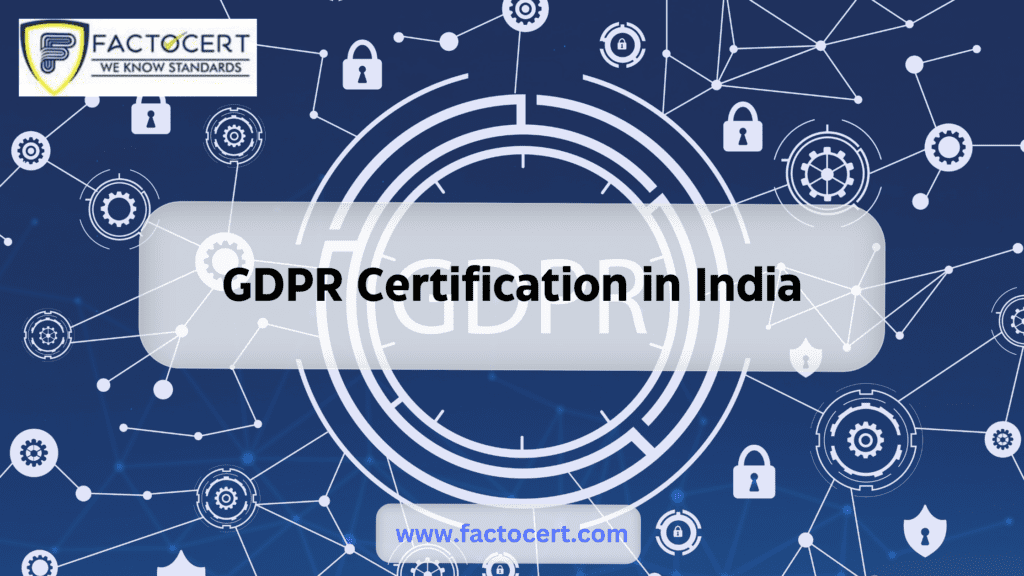GDPR Certification for Protecting personal information has become very important in a world that is becoming increasingly computerised. The European Union (EU) passed the General Data Protection Regulation (GDPR), a set of laws meant to protect people’s privacy and rights regarding their personal data. Even though GDPR is an EU law, it has effects worldwide, even in places like India. Many Indian companies want to know if GDPR approval is required and, if it is, how much it will cost.
Understanding GDPR Certification
Understanding GDPR compliance and why it is crucial for companies in India before getting into the licensing question is essential. GDPR refers to all organisations in the EU that handle the personal data of EU citizens, no matter where those organisations are located. This means that an Indian company must follow GDPR rules if it gathers, processes, or stores the personal data of EU people.
The GDPR spells out rules for the legal handling of personal data, such as the need for clear information, permission, and safety steps. Fines of up to 4% of the company’s global yearly sales or €20 million, whichever is higher, can be given for not following the rules. Because of these effects, a lot of Indian companies want to make sure they follow GDPR rules.
Does India need GDPR Certification?
India does not require GDPR approval at this time. The GDPR doesn’t say that companies must get a licence to show that they follow the rules. However, groups must put in place steps and procedures to ensure they follow the restrictions set out in the law.
Even though getting certified isn’t required, it can be a smart move for businesses. GDPR Certification, sometimes called ISO 27701 Certification, is proof from a third party that a company has taken the necessary steps to protect personal data in line with GDPR rules. It can help a business’s image, earn customers’ trust, and show that it cares about keeping data safe.
What GDPR Certification Means for Costs
The cost of GDPR Certification can change based on several factors, such as the chosen Certification body, the company’s size and complexity, and the industry it works in. In general, getting certified includes an initial evaluation, putting in place the necessary steps, and a final exam.
Initial Assessment: Companies often do an initial assessment before going for approval to find holes in how they now handle data. This can be done by using in-house experts or hiring outside consultants. This test can cost different amounts, but it is an essential first step in getting certified.
Costs of Implementation: Once the gaps are found, businesses have to take steps to fill them. This could mean changing rules, improving protection, and training staff. Depending on how many changes need to be made, the cost of adoption can be modest to high.
Certification Audit: Once a company has taken all the necessary steps, it goes through a Certification audit run by a recognized Certification group. The audit checks to see if the group is following GDPR rules. The audit has different costs that depend on the organisation’s size and complexity.
Ongoing Maintenance: Ensuring you’re following GDPR rules is an ongoing process that needs to be watched over and changed as threats and regulations change. Organisations should plan for ongoing upkeep costs. To ensure they stay legal over time.
Advantages of Being Certified by GDPR
Some costs come with GDPR approval, but the benefits can be worth it for many companies. Some significant benefits are:
Better Reputation: Getting certified shows that you care about data security, which builds trust with buyers, partners, and other important people.
Advantage in the market: Being licensed can help a business stand out from others in the same field and attract customers who care about data protection.
Legal and Regulatory Compliance: Certification gives you an organised way to ensure you follow GDPR rules, lowering your risk of getting fined or facing other legal issues.
Access to the Global Market: Certification can help international business by letting partners and buyers know the company follows global data security standards.
Why Choose Factocert GDPR Certification in India?
Factocert is one of India’s leading GDPR Certification providers. We provide GDPR Consultant services in India. We are trusted GDPR Certification Bodies in India and provide services in different states such as Mumbai,Bangalore,Delhi etc for consultation visit our website www.factocert.com or you can also get in touch with us at contact@factocert.com and factocert also provide different ISO Standards like ISO 27001, ISO 9001, ISO 45001, ISO 13485, ISO 17025, ISO 14001, ISO 22000, etc… At a better cost.
Conclusion
In India, GDPR approval is not required, but it can benefit businesses that handle EU citizens’ data. Certification costs different amounts, and companies should weigh the pros and cons before starting the Certification process. Ultimately, an organisation’s choice to go after GDPR approval should align with its commitment to privacy and data security and its global market strategy. In a world where data is valuable, companies in India and worldwide may want to invest in GDPR compliance as an intelligent and forward-thinking move.
For More information visit : GDPR Certification in India





